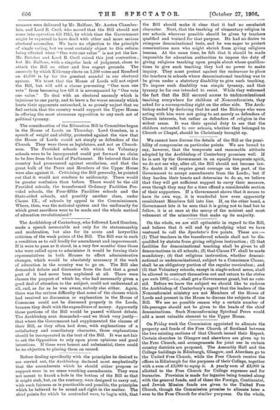The Archbishop of Canterbury, who followed Lord Goschen, made a
speech memorable not only for its statesmanship and moderation, but also for its acute and lawyerlike criticism of the weak points of the Bill. The Bill was in such a condition as to call loudly for amendment and improvement. If it were to pass as it stood, in a very few months' time those who were called upon to administer it would be forcing their representatives in both Houses to effect administrative changes, which would be absolutely necessary if the work of education in the country was to go on. The Bill also demanded debate and discussion from the fact that a great part of it had never been explained at all. There were clauses the purport of which he, who had necessarily given a good deal of attention to the subject, could not understand at all, and, as far as he was aware, nobody else either. Again, there was the serious difficulty that some of the clauses which had received no discussion or explanation in the House of Commons could not be discussed properly in the Lords, because they dealt with the expenditure of money. Apparently those portions of the Bill would be passed without debate. The Archbishop next demanded—and we think very justly— that where the Government had supplemented the clauses of their Bill, as they often had done, with explanations of a satisfactory and conciliatory character, those explanations should be incorporated in the text of the Bill. It was not fair to ask the Opposition to rely upon pious opinions and good intentions. If these were honest and substantial, there could be no objection to placing them on record.














































 Previous page
Previous page